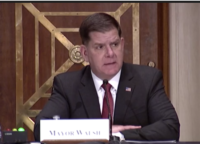Long-time management-side labor attorney Eugene Scalia, President Trump's nominee to head the Dept. of Labor, has won Senate approval.
The vote on Sept. 26 to confirm him was 51-44, along party lines.
Scalia's approval came just one week after his confirmation hearing before the Senate Health, Education, Labor and Pensions Committee and only two days after the committee cleared him, 12-11, also along party lines.
After Scalia is sworn in, he will face several major construction-related issues. Perhaps the most closely watched will be the fate of DOL's proposed changes in apprenticeship programs.
During his Sept. 19 confirmation hearing, Scalia was quizzed about the apprenticeship regulation and a range of other topics, but most topics but he didn't commit to specific actions he would take as labor secretary. [View committee video of hearing here.]
Republicans on the panel gave the nominee, the son of the late Supreme Court Justice Antonin Scalia, a warm welcome, with Chairman Lamar Alexander (R-Tenn.) saying, "He is altogether well-qualified for this job."
Democrats, pointing to his record of representing businesses in labor-related cases, worried that workers wouldn't fare well under his leadership at the department.
The sharpest criticism came from the committee's top Democrat, Patty Murray of Washington, who said, "Instead of nominating a Secretary of Labor, President Trump has nominated a 'Secretary of Corporate Interests.' "
Scalia won the committee's approval on Sept. 24 on a 12-11 vote that split along party lines. That action sends the nomination to the full Senate for its consideration.
The hottest construction issue at DOL is the department's proposed regulation revamping apprenticeship programs. It would allow companies to take part in new Industry Recognized Apprenticeship Programs (IRAPs), for which businesses would draw up curricula and set standards.
That would be a major change from the current system, in which DOL registers apprentices and programs either directly or through state agencies.
The proposed rule's key construction provision is its proposed exemption, at least temporarily, for the industry from IRAPs.
The building trades unions strongly support the exemption and want to see it made permanent. Some contractor groups that have joint apprenticeship and training programs with the unions also back the exemption.
But the Associated Builders and Contractors wants to cancel the exemption and have DOL allow IRAPs in construction.
Apprenticeship proposal
Scalia said, "I think there's consensus to an extent that more apprenticeships [overall] would be a good thing." He added, "I recognize that some are concerned that [an apprenticeship expansion] might be approached in a way that undermines successful programs or that doesn't really provide the rigor needed to protect the interests of workers."
DOL is reviewing the more than 300,000 comments it received on the proposed apprenticeship regulation before the late August deadline. The next step would be drafting a final rule, a process that is likely to take months.
Scalia said, "I know that [the proposed rule] is one of the very important things that will be on my plate an what the public has to say in that notice and comment period is going to be important to me in striking the right balance."
On another topic, Sen. Tammy Baldwin (D-Wis.) said enforcement activity is down at DOL's Occupational Safety and Health Administration, adding that the number of OSHA inspectors reportedly is "at record lows." She asked Scalia whether he would support an increase in the agency's roster of inspectors.
Scalia noted that the number of OSHA inspectors is lower than former DOL Secretary Anthony Acosta had wanted. He added, "I would commit to you to take a look at steps that might be necessary to get the number of inspectors up to an appropriate level."
Multiemployer pensions
Sen. Tina Smith (D-Minn.) brought up the problem of struggling multiemployer pension plans, which are common in unionized construction. Scalia said he agrees that "something does need to be done," adding that "I think everybody recognizes the need to negotiate out some legislative solution."
Smith, seeking a more specific commitment, asked Scalia whether he supports a long-term loan program for troubled multiemployer plans, the centerpiece of a bill that the House recently approved.
But the nominee dodged, saying, "I would be interested in looking at the different approaches to be taken and finding one that helps workers and also helps workers and also helps taxpayers" as well as the Pension Benefit Guaranty Corp., the federal agency that insures pension plans.
Story updated on 9/26/19 with Senate confirmation vote.





Post a comment to this article
Report Abusive Comment